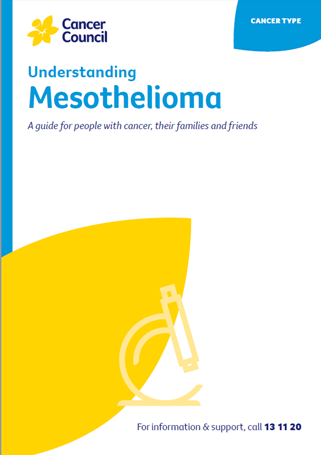- Home
- Peritoneal mesothelioma
- Diagnosis
Peritoneal mesothelioma diagnosis
Mesothelioma can be difficult to diagnose because the symptoms are similar to other health problems. Mesothelioma cells can look similar to other types of cancer cells or even like normal cells.
Learn more about:
Overview
The process for diagnosing peritoneal mesothelioma often starts after seeing your GP or going to a hospital emergency department with shortness of breath, pain or another symptom. The doctor will examine you and take a history of your general health.
If you think that you may have been exposed to asbestos – even if it was a long time ago – it’s important to let your doctor know. They will send you for initial tests and then refer you to a specialist – usually a respiratory physician (for chest symptoms) or a gastroenterologist (for abdominal symptoms).
You are likely to have several tests and see a range of different health professionals before a diagnosis of mesothelioma is made. This process can feel long and frustrating.
→ READ MORE: Peritoneal mesothelioma tests
Podcast: Tests and Cancer
Listen to more episodes of our podcast for people affected by cancer
More resources
Dr Anthony Linton, Medical Oncologist, Concord Cancer Centre and Concord Repatriation General Hospital, NSW; Dr Naveed Alam, Thoracic Surgeon, St Vincent’s Hospital Melbourne and Monash Medical Centre, VIC; Donatella Arnoldo, Consumer; Polly Baldwin, 13 11 20 Consultant, Cancer Council SA; Dr Melvin (Wee Loong) Chin, Medical Oncologist, Sir Charles Gairdner Hospital and National Centre for Asbestos Related Diseases, WA; Prof Kwun Fong, Thoracic and Sleep Physician and Director, UQ Thoracic Research Centre, The Prince Charles Hospital, and Professor of Medicine, The University of Queensland, QLD; Vicki Hamilton OAM, Consumer and CEO, Asbestos Council of Victoria/GARDS Inc., VIC; Dr Susan Harden, Radiation Oncologist, Peter MacCallum Cancer Centre, VIC; Penny Jacomos, Social Worker, Asbestos Diseases Society of South Australia, SA; Prof Brian Le, Director, Parkville Integrated Palliative Care Service, The Royal Melbourne Hospital and Peter MacCallum Cancer Centre, VIC; Lung Cancer Support Nurses, Lung Foundation Australia; Jocelyn McLean, Mesothelioma Support Coordinator, Asbestos Diseases Research Institute, NSW; Prof David Morris, Peritonectomy Surgeon, St George Hospital and UNSW, NSW; Joanne Oates, Registered Occupational Therapist, Expert Witness in Dust Diseases, and Director, Evaluate, NSW; Chris Sheppard and Adam Barlow, RMB Lawyers.
View the Cancer Council NSW editorial policy.
View all publications or call 13 11 20 for free printed copies.
Need to talk?
Support services
Coping with cancer?
Speak to a qualified health professional someone who has been there, support groups & forum
Looking for transport, accommodation or home help?
Practical advice and support during and after treatment
Cancer information
Pleural mesothelioma
Learn about this type of mesothelioma, its symptoms, diagnosis, treatment, and how to manage its symptoms
Dealing with the diagnosis
Common reactions to a cancer diagnosis and how to find hope

